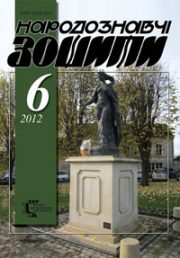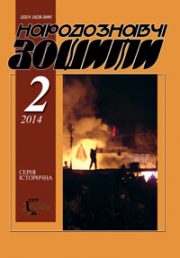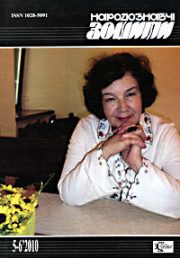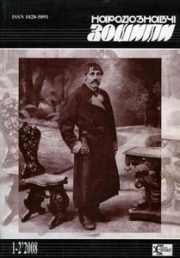The Ethnology Notebooks. 2019, № 5 (149), 1178—1184
UDK 398.87:784.71(477)
DOI https://doi.org/10.15407/nz2019.05.1178
HISTORICAL AND SOCIAL BACKGROUND OF RECRUITS’ AND SOLDIERS’ SONGS
YARYNCHYNA Olena
ORCID ID: https://orcid.org/0000-0001-9107-5697
Leading Research Editor
Rylsky Institute of Art Studies, Folklore and Ethnology
National Academy of Sciences of Ukraine,
4, Hrushevskyi Str., 01001, Kyiv, Ukraine
e-mail: ol.yarynchyna@gmail.com
Abstract. The studies of Ukrainian folk social songs in general and each of the genres, belonging to this group, in particular are conducted for many years. The scientists analyze material, write important comments concerning typological and individual peculiarities, genre characteristics, classification positions, etc. Thus, the necessity of a comprehensive and thorough study of recruits’ and soldiers’ songs actualizes the need for such research. Certainly, the consideration of this phenomenon has been carried out during the whole period of its existence. In particular, M. Kostomarov, V. Antonovych, O. Hrushevskyi, M. Zubrytskyi have paid attention to it. In the XXI century comprehension of this genre of folklore is a sporadical one, while historians works deepen an understanding of this phenomenon aspects. The urgency of the article is caused by need for an extended study. We should present in it, at first the historians achievements in the recruits’ duty investigation, determine its main stages, show the legal base for its realization, the other versions in law, the differences between theoretical and practical implementation. Secondly it is important to present the evidences of historians and ethnographers recorded from the eyewitnesses and events participants as to the practice of recruits’ duty realization, attitude of ordinary people to it in general, and government officials in particular.
Therefore, the article is aimed at the consideration of recruits’ duty as a historical phenomenon, its national vision and reflection in folklore. The source database consists of legal documents, encyclopedic editions, historians works, where some aspects of the problem, reviews of ethnographers with the evidences of eyewitnesses and executors of recruits’ duty, texts of Ukrainian folk recruits’ and soldiers’ songs are presented. Mainly the comparative-historical and descriptive, partly structural-typological methods are used in the investigation.
Basing on the evidences of scholars, the article’s authoress outlines the main problems and consequences, caused with the establishment and existence of the indicated duty, first of all, while accomplishing it in kind. In addition, the service’s impact on life of Ukrainians at social, material and everyday levels is noted. The trustworthiness of duty depiction in recruits’ and soldiers’ songs is remarked.
Keywords: recruit’s compulsory service, recruits’ and soldiers’ songs, social songs of Ukraine, folklore interpretations of historical phenomena.
Received 17.10.2019
REFERENCES
Volkovyns’kyj, V. (2012). Recruitment Service. In Encyclopedia of Ukrainian History (Vol. 9, p. 173). Kyiv: Naukova dumka [in Ukrainian].
Recruitment in Russia. (1847). In Military encyclopedic lexicon (Part 11, pp. 364—365). St. Petersburg [in Russian].
Recruit. (1847). In Military encyclopedic lexicon (Part 11, p. 365). St. Petersburg [in Russian].
Vasiliev, M. (1889). Recruitment in Little Russian Song (ethnographic essay). Kievskaja starina, 8, 354—376 [in Russian].
Ioanidi, A., & Pravdyuk, O. (Eds.). (1974). Recruiters and soldiers songs. Kyiv: Naukova Dumka [in Ukrainian].
Hrushevsky, O. (Ed.). (1907). According to the catastrophe of 1708 fate: Placement of Russian regiments in Ukraine. Notes Science Association named after Shevchenko (Vol. LXXVIII, b. IV, pp. 5—25) [in Ukrainian].
Vasiliev, M. (1889). Recruitment in Little Russian Song (ethnographic essay). Kievskaja starina, 9, 615—630 [in Russian].
Zubrytsky, M. (1901). Accusations to the history of recrution in Galicia at the end of the 18th — half of the 19th century. Notes Science Association named after Shevchenko (Vol. XLII, b. IV, pp. 1—18) [in Ukrainian].
Kilimnik, S. (1959). Ukrainian year in folk customs in historical light (Vol. 2). Winnipeg; Toronto [in Ukrainian].







